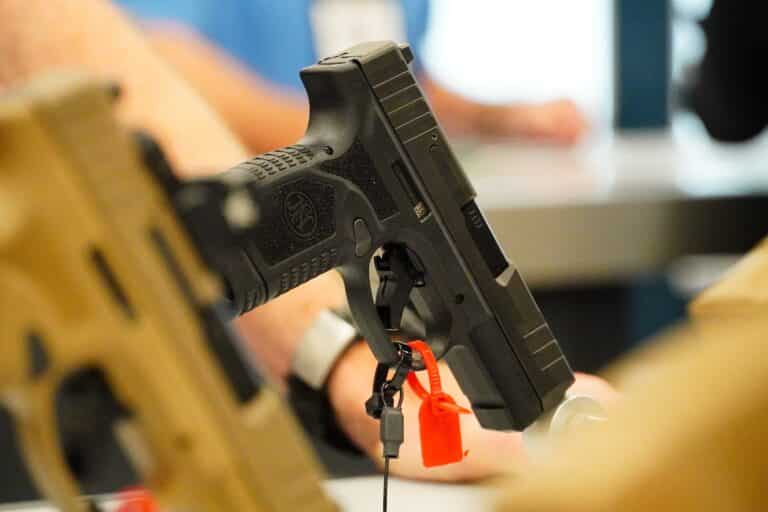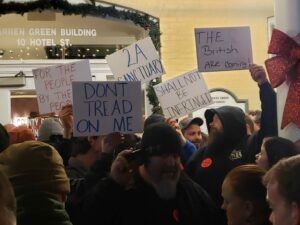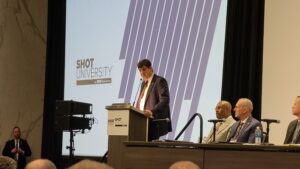Missouri’s attempt to invalidate federal gun laws was undone by a federal court this week.
On Monday, a unanimous panel on the Eighth Circuit Court of Appeals found the show-me state’s Second Amendment Preservation Act (SAPA) actually violates the Constitution it’s meant to protect. It argued several of the provisions went beyond setting limits on how state resources could be used to enforce federal gun laws and into an attempt to nullify those laws. The panel, which featured George W. Bush, George H. W. Bush, and Barack Obama appointees, determined the state’s law represented a repudiation of the Constitutional order.
“The Supremacy Clause states that federal law is ‘the supreme Law of the Land, . . . any Thing in the Constitution or Laws of any State to the Contrary notwithstanding.’ ‘By this declaration, the states are prohibited from passing any acts which shall be repugnant to a law of the United States,'” Judge Steven Colloton, the George W. Buch appointee, wrote for the panel in US v. Missouri. “The ‘Second Amendment Preservation Act’ states that certain federal laws are ‘invalid to this state,’ but a State cannot invalidate federal law to itself.”
The ruling cements the limits of the Second Amendment “sanctuary” movement. While gun-rights activists have had great success in getting state and local officials to pledge not to use their resources to enforce gun laws they oppose, some have extended their efforts into declarations the laws aren’t valid inside the jurisdiction. Courts have consistently shot down those attempts.
In February 2023, a three-judge panel for the Oregon Court of Appeals ruled that a similar Columbia County Second Amendment “sanctuary” ordinance purporting to invalidate gun laws made outside the county violated the state’s firearm preemption law. A Texas law purporting to bypass silencer regulations in the National Firearms Act (NFA) was dealt another blow in June after a panel on the Fifth Circuit unanimously ruled against Attorney General Ken Paxton’s attempt to litigate the dispute, which effectively leaves the NFA’s silencer requirements in effect in Texas.
The fight in Missouri started after the state passed SAPA in 2021. The law’s sometimes vague language, which includes fines for state or local law enforcement who cooperate with federal officials in some cases, disrupted some task forces. The Department of Justice then sued to try and get the law tossed.
Like many other Second Amendment sanctuary-style laws, Missouri aimed to stop state officials from working with federal officials to enforce certain federal gun laws. However, Missouri took it a step further. It claimed to invalidate any national laws and regulations that it deemed to violate the Second Amendment.
“All federal acts, laws, executive orders, administrative orders, rules, and regulations, regardless of whether they were enacted before or after [SAPA] that infringe on the people’s right to keep and bear arms as guaranteed by the Second Amendment… shall be invalid to this state, shall not be recognized by this state, shall be specifically rejected by this state, and shall not be enforced by this state,” the law said.
As is often the case with Second Amendment “sanctuary” resolutions, some measures in SAPA were more symbolic or forward-looking. One example is SAPA’s rejection of any federal act “ordering the confiscation of firearms” since no federal law currently generally does that. But other provisions, like the rejection of “any tax, levy, fee, or stamp” imposed on firearms and ammunition, do appear to directly challenge the validity of current federal law.
For instance, the Pittman-Robertson Act began levying an excise tax on all sporting firearm and ammunition purchases in 1937. Similarly, the NFA requires owners to register and pay a tax on things like short-barreled rifles and silencers.
In March 2023, District Judge Brian C. Wimes ruled against the Missouri law. He found it violated the Supremacy Clause and complained it had disrupted police cooperation.
“SAPA’s practical effects are counterintuitive to its stated purpose,” Judge Wimes, a Barack Obama appointee, wrote in his opinion. “While purporting to protect citizens, SAPA exposes citizens to greater harm by interfering with the Federal Government’s ability to enforce lawfully enacted firearms regulations designed by Congress for the purpose of protecting citizens within the limits of the Constitution.”
The appeals panel agreed on that point. They also agreed with Wimes’s finding that the entire law must be struck down.
“The Act’s command that state law enforcement officers must not enforce ‘invalid’ federal law, and the Act’s creation of causes of action against state entities that employ officers who do so, are means to ‘enforce’ sections 1.410, 1.420, 1.430, and 1.440,” Judge Colloton wrote for the panel. “The court thus cannot give effect to any provision of the Act without enforcing Missouri’s attempt to invalidate federal law. Accordingly, the district court’s order enjoining state officials from implementing and enforcing the Act was proper.”
Missouri didn’t dispute the Supremacy Clause. Instead, it argued that the law was allowed under Supreme Court precedent, which determined that the federal government can’t compel states to enforce federal laws. But the panel was not convinced.
“That Missouri may lawfully withhold its assistance from federal law enforcement, however, does not mean that the State may do so by purporting to invalidate federal law,” Judge Colloton wrote. “In this context, as in others, the Constitution ‘is concerned with means as well as ends.’ Missouri has the power to withhold state assistance, ‘but the means it uses to achieve its ends must be ‘consist[ent] with the letter and spirit of the constitution.” Missouri’s assertion that federal laws regulating firearms are ‘invalid to this State’ is inconsistent with both. If the State prefers as a matter of policy to discontinue assistance with the enforcement of valid federal firearms laws, then it may do so by other means that are lawful, and assume political accountability for that decision.”
Missouri Attorney General Andrew Bailey’s office did not say if the state planned to appeal the decision. However, spokesperson Madeline Sieren said they are considering it.
“We are reviewing the decision,” she told The Reload. “We will always fight for Missourians’ Second Amendment rights.”






